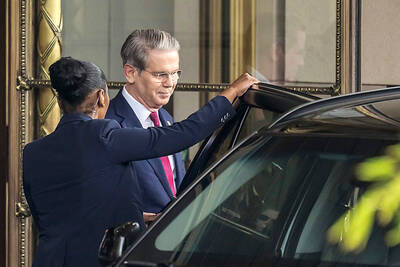■ Steel
Severstal reveals LSE plans
Severstal, Russia's second-largest steel maker, said yesterday it would hold an initial public offering on the London Stock Exchange by the end of the year. "Severstal announces today its intention to list Global Depositary Receipts [GDRs] representing its ordinary shares on the London Stock Exchange," it said in a statement. "It is currently anticipated that the global offering will take place and that the GDRs will be admitted to trading on the London Stock Exchange by the end of the year."
■ Banking
Deutsche Bank eyes growth
Deutsche Bank AG said on Thursday it is targeting a big jump in earnings over the next two years with both organic growth and acquisitions. Germany's biggest bank said it was aiming to raise its pre-tax profit to 8.4 billion euros (US$10.7 billion) in 2008, It posted pre-tax profit of 6.1 billion euros last year. Chief executive Josef Ackermann said in a statement that several recent takeovers "prove our determination to expand our franchise." Ackermann said the group wants to expand units including private banking and asset management while becoming more competitive in corporate and investment banking.
■ Taxation
Euro tax plans on course
Plans for a pan-European tax system will go ahead, despite opposition from seven EU member states, the EU's tax commissioner said in an interview published in the Financial Times yesterday. Laszlo Kovacs said if seven member states continue to oppose the plans, thus far strongly backed by 10 states, and tentatively by the remaining eight, the common tax base could be used by a limited group of countries, much like the euro or Schengen agreement. Among the many obstacles facing the creation of a pan-European corporate tax system is how to distribute revenues between jurisdictions, along with issues raised by income earned outside the EU.
■ Computers
Hitachi to recall batteries
Japan's Hitachi Corp said yesterday that it plans to recall about 16,000 laptop battery packs made by Sony Corp, a company spokesman said, the latest in a massive global recall of the batteries that can overheat and catch fire. The battery packs were installed in the company's Flora 210W and Flora Se210 laptop personal computers for the Japanese market, Hitachi spokesman Masahiro Takahashi said. Hitachi has not received any reports of problems with the batteries, the company said in a statement. It said it is undertaking the recall "for its customers' peace of mind." Almost every major laptop maker has told customers to return Sony-made lithium-ion batteries, which can overheat and catch fire.
■ Trade
PRC slams EU shoe tariffs
China criticized EU antidumping tariffs on Chinese shoes as unlawful and threatened possible retaliation. The tariffs violate WTO regulations and the EU's own antidumping laws, the Chinese Commerce Ministry said on Thursday. The Chinese government "reserves the right to take relevant measures," a ministry spokesman said in the statement. EU ministers agreed on Thursday to impose higher tariffs on Chinese and Vietnamese shoes for two years in order to prevent low-cost imports from flooding European markets. Shoes from China will be charged an extra 16.5 percent duty.

Taiwanese Olympic badminton men’s doubles gold medalist Wang Chi-lin (王齊麟) and his new partner, Chiu Hsiang-chieh (邱相榤), clinched the men’s doubles title at the Yonex Taipei Open yesterday, becoming the second Taiwanese team to win a title in the tournament. Ranked 19th in the world, the Taiwanese duo defeated Kang Min-hyuk and Ki Dong-ju of South Korea 21-18, 21-15 in a pulsating 43-minute final to clinch their first doubles title after teaming up last year. Wang, the men’s doubles gold medalist at the 2020 and 2024 Olympics, partnered with Chiu in August last year after the retirement of his teammate Lee Yang

FALSE DOCUMENTS? Actor William Liao said he was ‘voluntarily cooperating’ with police after a suspect was accused of helping to produce false medical certificates Police yesterday questioned at least six entertainers amid allegations of evasion of compulsory military service, with Lee Chuan (李銓), a member of boy band Choc7 (超克7), and actor Daniel Chen (陳大天) among those summoned. The New Taipei City District Prosecutors’ Office in January launched an investigation into a group that was allegedly helping men dodge compulsory military service using falsified medical documents. Actor Darren Wang (王大陸) has been accused of being one of the group’s clients. As the investigation expanded, investigators at New Taipei City’s Yonghe Precinct said that other entertainers commissioned the group to obtain false documents. The main suspect, a man surnamed

US Secretary of the Treasury Scott Bessent and US Trade Representative Jamieson Greer began talks with high-ranking Chinese officials in Switzerland yesterday aiming to de-escalate a dispute that threatens to cut off trade between the world’s two biggest economies and damage the global economy. The US delegation has begun meetings in Geneva with a Chinese delegation led by Chinese Vice Premier He Lifeng (何立峰), Xinhua News Agency said. Diplomats from both sides also confirmed that the talks have begun, but spoke anonymously and the exact location of the talks was not made public. Prospects for a major breakthrough appear dim, but there is

The number of births in Taiwan fell to an all-time monthly low last month, while the population declined for the 16th consecutive month, Ministry of the Interior data released on Friday showed. The number of newborns totaled 8,684, which is 704 births fewer than in March and the lowest monthly figure on record, the ministry said. That is equivalent to roughly one baby born every five minutes and an annual crude birthrate of 4.52 per 1,000 people, the ministry added. Meanwhile, 17,205 deaths were recorded, resulting in a natural population decrease of 8,521, the data showed. More people are also leaving Taiwan, with net